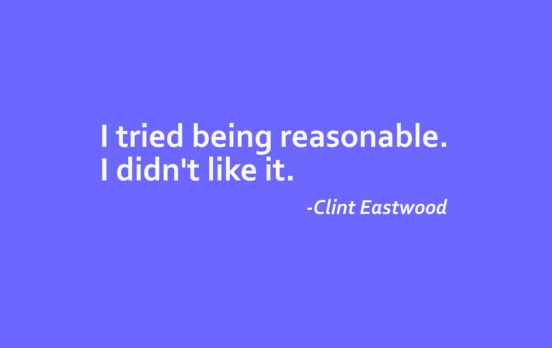Chris Evans
In every arena, whether pursuing practical or purely philosophical truths, reasons are paramount. If an organization must make an important decision, what is sought are well-founded reasons why one option is better than another. Theories of applied science are accepted or rejected on the basis of how well they are methodologically and evidentially justified (i.e. how well-reasoned they are). Logical and mathematical propositions are established by means of deductive argument and proof, the strictest kind of reason. Even (maybe especially) in our personal lives, particularly when change or decision is required, we look for the best reasons – sometimes to reveal the optimal choice, other times to defend the choice we’ve already made. However, when it comes to the attainment of particular outcomes, it seems that what’s reasonable is not always as useful.
In the work I do with most of my clients, time is spent focusing on issues that have their origin in beliefs and in their justification. Many are struggling with a mismatch between their wishes and the reality of their circumstances. The source of this disharmony is often unrealistic or difficult-to-justify beliefs about how self and world should be. It’s probably true for most of us in one area or another: unreasonableness in the form of persistent and unrealistic expectations is precisely what stymies progress. To make matters worse, the more accustomed we become to stagnating, the more “reasonable” it will seem that things should continue in the same way. And, if what’s reasonable is the limit of what we aspire to, it’s also the best we can hope to achieve.
On the other hand, think of those whose accomplishments were based on more than just what they had good reason to believe, but also on their unprecedented and under-justified aspirations. Alexander the Great conquered most of the known world within twelve years of assuming the throne. Employing non-violent civil disobedience, Gandhi led India to independence and inspired movements for civil rights and freedom across the world. Consider also the lasting achievements of great artists or the contributions of history’s greatest visionaries. Even ordinary change requires at least a little belief beyond what is certain. Confidence for example, if not entirely reasonable, can help create conditions for success that talent alone can’t realize. Further, it seems obvious that the willingness to take goal-directed risks, to attempt things that are not entirely sensible, increases the chances of victory. This is the intuitively plausible heart of every success-story biopic.
“The reasonable man adapts himself to the world; the unreasonable one persists in trying to adapt the world to himself. Therefore all progress depends on the unreasonable man.” –George Bernard Shaw
What I’m left wondering is how to identify and cultivate the most effective attitudes about personal and professional goals, not necessarily the most reasonable ones. Though many advise that we should “fake it ‘til we make it”, this approach has never appealed to me because it seems to endorse deception (either self-deception or the deception of others). If it is confidence or even overconfidence that’s required, I would rather practice to become more proficient and comfortable with the inevitable failures that accompany “aiming high”. But, after many failures, it seems more reasonable – more justified – to abandon goals. “Reaching for the stars” seems like poor advice whenever our ambitions outstrip our capabilities. One’s capability, however, can’t be known without experimentation. We can’t rely on our interpretation of the past or the opinion of others to gauge our limits, they can both be proven wrong. The only way to find out what we are capable of is to try. I suppose it is up to each individual to decide how much is enough. Until then, perhaps the best policy is to cultivate some measure of unreasonableness.
Chris Evans
kontakt @ filoprax.se






Kommentarer av Filoprax
#8 ”Medborgarlön – ja eller nej?”
Ännu fler tankar: https://www.theguardian.com/technology/2017/may/08/virtual-reality-religion-robots-sapiens-book Vi ses 17/1 :)
#2 Rättrådighet / justice ∙ dikaiosyne ∙ iustitia
Spellistan klar: https://open.spotify.com/user/professormiriam/playlist/0QXnyFfykMg4JeECEWxlAa
Några punkter om vardaglig människo-enteleki
Mmm, jag med ...
Några punkter om vardaglig människo-enteleki
Jaa! :)